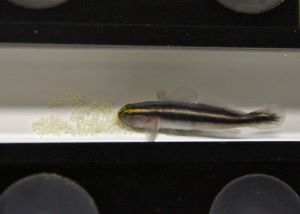Ecolini_MaleWEggs_Lab_Majoris_edit.jpg

A male neon goby tending eggs in its nest in a laboratory. He prepares his offspring for the world by regulating the timing of hatch. When the time comes, he will pick them up in his mouth and expel them from the nest. Credit: John Majoris.
Many species of egg-laying animals decide when it’s time for their offspring to leave the nest, but a little fish known as the neon goby takes that a step further. They decide when their young will even hatch from their eggs. Leaving their eggs is a precarious time for any animal because the new hatchlings are at their most vulnerable. Typically, the timing of hatching depends on the embryo or on external environmental cues, such as temperature. But for neon gobies, fathers seem to know the best time to introduce their little ones to the world.
When male gobies decide it’s time for their young to hatch, they remove the eggs from the nest with their mouth, swim to the opening of the sponge where they live, and then spit them out at the sponge’s
entrance. It’s not clear how the males know the conditions are right for hatching, but in a laboratory experiment, all the male gobies chose to spit out their eggs from their home sponge at sunrise on the seventh day of embryonic development.
Waiting for dad to make the call appears to benefit the young gobies’ chances of survival. The gobies who hatch when dad spits them out tend to be larger and more developed—and therefore better equipped to find food, avoid predators and navigate the seas—than gobies that hatch on their own. In fact, neon gobies tend to be underdeveloped and hatch up to 50% earlier when their parents aren’t around. The behavior demonstrates one of the various ways that some reef fish can increase their offspring’s chances of survival from their first day of life.


